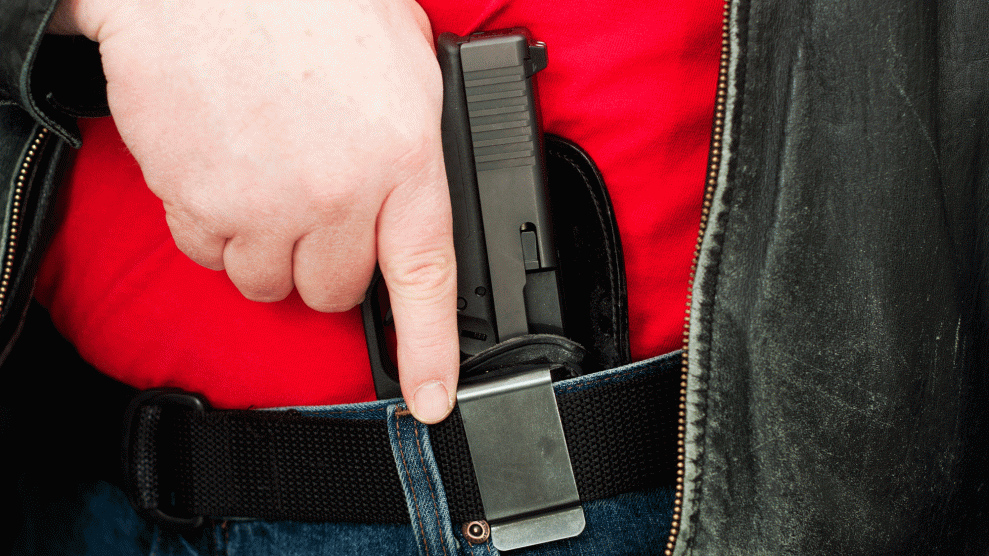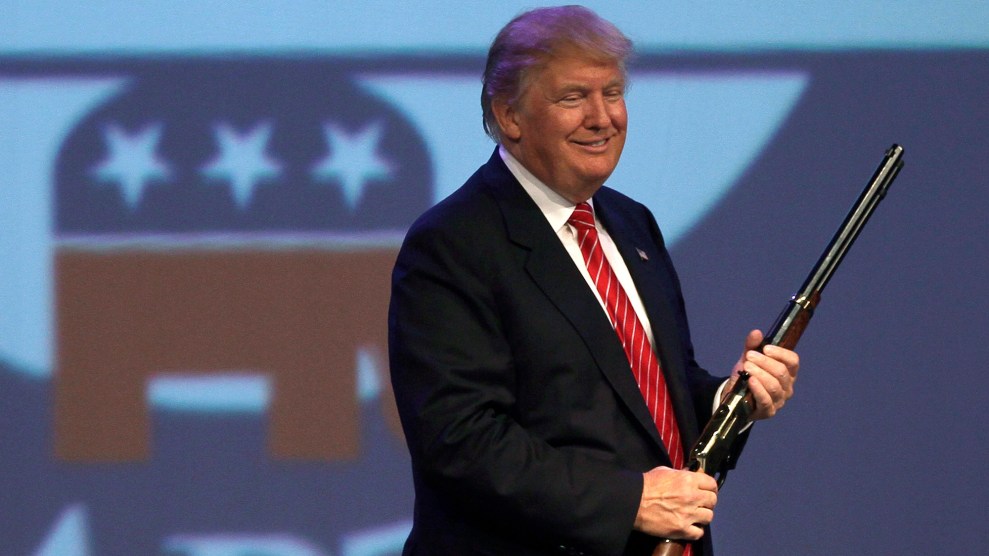
RonBailey/iStock
The semi-perennial attempt by House Republicans to allow anyone permitted to carry a concealed gun in one state to be able to do so in any other state—even if that state has much stricter standards for issuing concealed carry permits—took a frightening step forward Wednesday afternoon. HR 38, the Concealed Carry Reciprocity Act of 2017, which the National Rifle Association (NRA) has called the group’s “highest legislative priority” in 2017, passed the House—taking the provision as close as its ever been to becoming reality.
Introduced by Rep. Richard Hudson (R-NC) on the first day of the year’s legislative session, HR 38 lingered relatively untouched for most of the year until last week when there was a flurry of unexpected activity: GOP leaders, after conducting a whip count and sensing the measure would have enough support to pass a floor vote, passed it out of the House Judiciary Committee, while simultaneously rejecting amendments brought by Democrats, including banning violent offenders. Debate on the House floor lasted just an hour on the bill, and six Democrats joined a united Republican caucus in voting to pass it. The legislation can now be taken up for a vote in the Senate.
Strategically, and despite the efforts of some on the left, Republicans had folded reciprocity into a broader guns package that also includes a bi-partisan measure called the Fix NICS Act—a provision aimed at improving the accuracy of background check data in order to prevent criminals and individuals with mental illness from being able to purchase guns. This notion gained particular urgency after the recent mass shooting in Texas, in which the gunman had been convicted of assaulting his wife and his infant stepson while in the Air Force, but the military never sent his criminal records to the background checks databases. The move put Democrats in a difficult position: In order to pass the Fix NICS Act—which has support from groups as varied as Everytown for Gun Safety and the Giffords Law Center to Prevent Gun Violence to the National Shooting Sports Foundation and the NRA—they had no real choice but to pass the national reciprocity bill, which in various forms has been opposed by the party for years.
Gun advocates typically claim that the need for reciprocity is a matter of convenience to travelers who must contend with a “patchwork” of gun laws while on interstate road trips, often decrying, as Rep. Trent Franks (R-AZ) did on Twitter after the House voted on Wednesday, “The Second Amendment doesn’t disappear when law-abiding citizens cross state lines. H.R. 38 guarantees that.”
Opponents, meanwhile, argue that reciprocity effectively guts existing state laws. Some states have stringent safeguards in place for issuing conceal carry permits, like mandating training and thorough evaluations; other states do almost nothing to vet the people who would be carrying guns in public. In Utah, for instance, all someone has to do to get a concealed carry permit is take a gun safety class certified by the Utah Bureau of Criminal Identification. In Virginia, people get four attempts to answer 15 of 20 questions correctly after taking an online course to get a permit. Currently, 19 states don’t require any gun safety training in order to carry a concealed gun in public, and 12 states don’t require a permit or background check, according to Everytown for Gun Safety. HR 38 effectively neutralizes the playing field. What’s more, there is a loophole that would allow individuals who don’t qualify for a permit in their state of residence to be able to get one in a state with little to no restrictions.
“Under Hudson’s bill, a California resident who cannot get a concealed-carry permit in California can easily get one from Utah, and then carry guns in California without ever setting foot in Utah, and not for some short duration like a tourist stay, but for the rest of his life and every day,” Adam Winkler, a law professor at the University of California-Los Angeles, explained to me when the bill was introduced in January. “The real impact of the Hudson bill is not to protect interstate travelers; it’s to require states with restrictive concealed-carry policies to allow their own residents to carry guns.”
A handful of previous efforts to pass national reciprocity have failed. And while HR 38 has now passed the House, a version of it will still have to contend with the Senate, which will need eight Democrats to support the measure for it to pass. While those prospects seem slim, if it were to pass the Senate, two things are certain: First, it’s all but guaranteed that President Trump will sign it into law. “Trump has been a strong supporter from the very beginning of the whole concept of concealed carry, even before he ran for president,” says Todd Rathner, a prominent gun rights lobbyists based in Arizona. “I don’t think he’d have any hesitations signing this.” The second is that lawsuits will be waiting. In a statement, Eric Tirschwell, director of litigation and national enforcement policy for Everytown for Gun Safety, said, “We fully expect that the Senate will hear the voices of law enforcement and the public, and stop this dangerous legislation from becoming law. But if it were to make it to the president’s desk, we’d be waiting on the other side fully prepared to challenge it in court.”








